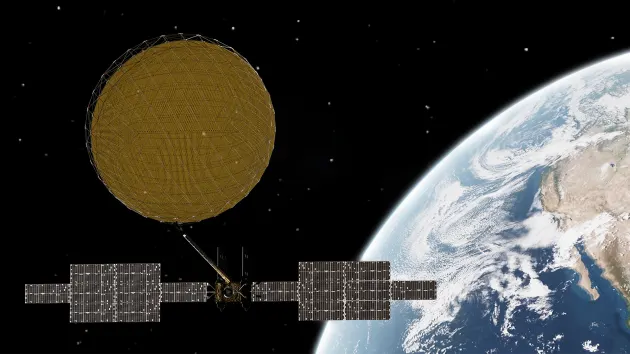After successful launch on 2023-04-30 and delivery directly to geostationary orbit by the first fully-expendable SpaceX Falcon Heavy mission, the Viasat-3 Americas satellite has apparently failed to deploy its huge antenna reflector in orbit. In a press release on 2023-07-12, Viasat announced:
CARLSBAD, Calif., July 12, 2023 /PRNewswire/ – Viasat, Inc. (NASDAQ: VSAT), a global leader in satellite communications, today disclosed that an unexpected event occurred during reflector deployment that may materially impact the performance of the ViaSat-3 Americas satellite. Viasat and its reflector provider are conducting a rigorous review of the development and deployment of the affected reflector to determine its impact and potential remedial measures.
“We’re disappointed by the recent developments,” said Mark Dankberg, Chairman and CEO, Viasat. “We’re working closely with the reflector’s manufacturer to try to resolve the issue. We sincerely appreciate their focused efforts and commitment.”
Contingency plans are currently being refined to minimize the economic effect to the company. Potential options include redeploying satellites from Viasat’s extensive fleet to optimize global coverage, and/or reallocating a subsequent ViaSat-3 class satellite to provide additional Americas bandwidth. The initial service priority for ViaSat-3 Americas has been to facilitate growth in the company’s North American fixed broadband business.

The stock market did not take kindly to this news.
Shares of Viasat fell as much as 21% in extended trading from its previous close at $42.98 a share.
Viasat did not disclose the identity of the reflector’s manufacturer in its release. Dankberg said his company is “working closely” with the manufacturer to resolve the problem. A Viasat spokesperson confirmed to CNBC that the manufacturer is a top aerospace and defense company – but noted that it is not Boeing, which built the 702MP+ bus that is the spacecraft’s structure and power.
The design of the reflector on the Viasat-3 Americas satellite appear to match the “AstroMesh” line of reflectors that Northrop Grumman advertises. Additionally, Viasat has said the “long boom arm” that supports the reflector is a “direct derivative” of the telescoping booms that Northrop Grumman built for NASA’s James Webb Space Telescope.
⋮
Industry publication SpaceIntelReport noted that, if the satellite is lost, Viasat may trigger a $420 million claim. A space insurance underwriter described the situation to CNBC as a “market changing event” for the sector.